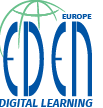
- This event has passed.
Porto
January 1, 1970 @ 00:00
Innovation and Creativity are considered to be key drivers for development in the 21st Century, and thus Knowledge-based societies need to place strong emphasis on establishing those flourishing conditions, which will make for the Creation of Ideas and Knowledge as well as for the better use of Knowledge and Innovation, in order to build value for their social systems. A set of Key Competencies are required, which enable all people to embrace change as an opportunity and to welcome as well as produce new ideas and approaches, in order to respond effectively to the challenges of the new participatory cultures and globalization.
Such Key Competencies favor innovative and creative social acting in the personal, interpersonal and intercultural fields. Sustaining Creativity and Innovation in Education constitutes a promising strategy to reach societal well being, through increasing understanding and promoting growth as well as addressing social inequalities. Placing Creativity and Innovation among the key objectives in the learning process, starting from early childhood through tertiary education, in the Lifelong Learning perspective, could be a major contribution to innovativeness in society. Learner-centered education supports the enhancement of Key Competencies, as the 21st Literacies, having the Learning to Learn, Mathematics, Mother & Foreign Language, Science & Technology, Cultural Awareness and Entrepreneurship, as major competencies among them.
In this context, sustainable change in Knowledge Building and Curriculum Development as well as the Pedagogies and the Teachers Professional Development could only be addressed by motivation and incentives, leadership and quality upgrade. In order to introduce this new Learning Culture, education authorities and institutions need to adopt changes in the fields of organization and governance and be reflective to emerging bottom-up initiatives, in a new balance between top-down planning and grass-roots implementation and quality regulation. Todays education systems have to cater for experimental innovation and tolerance of failure, thus encouraging innovative approaches and practice. School Autonomy whether formal or informal – provides with the grounds for releasing and developing Creativity and Innovation. So, it seems that the enhancement of School Autonomy, Teachers professional development as well as of Networking among school communities, constitute an effective way for moving towards the future, by serving Excellence and Learning Efficiency while catering for Equity and Social Inclusion.
To bring up and reflect upon these considerations, EDEN in the framework of its Open Classroom Initiative is organizing this Conference on The European School 2.0: Incubating Creativity and the Capacity for Innovation, together with the Universidade Aberta, the Portuguese Open University, and the University of Porto as well as the support of other European and international expert bodies. The Conference aims at enriching the European dialogue around the 21st Century School, while contributing to the European Education policies and the objectives of the European Year for Creativity and Innovation 2009. It will offer the opportunity to European schools and teachers to present and reflect upon their innovative experiences, in such a way to enhance cross-country Good Practice on introducing and managing Innovation in the school systems, to the benefit of the quality in education.
